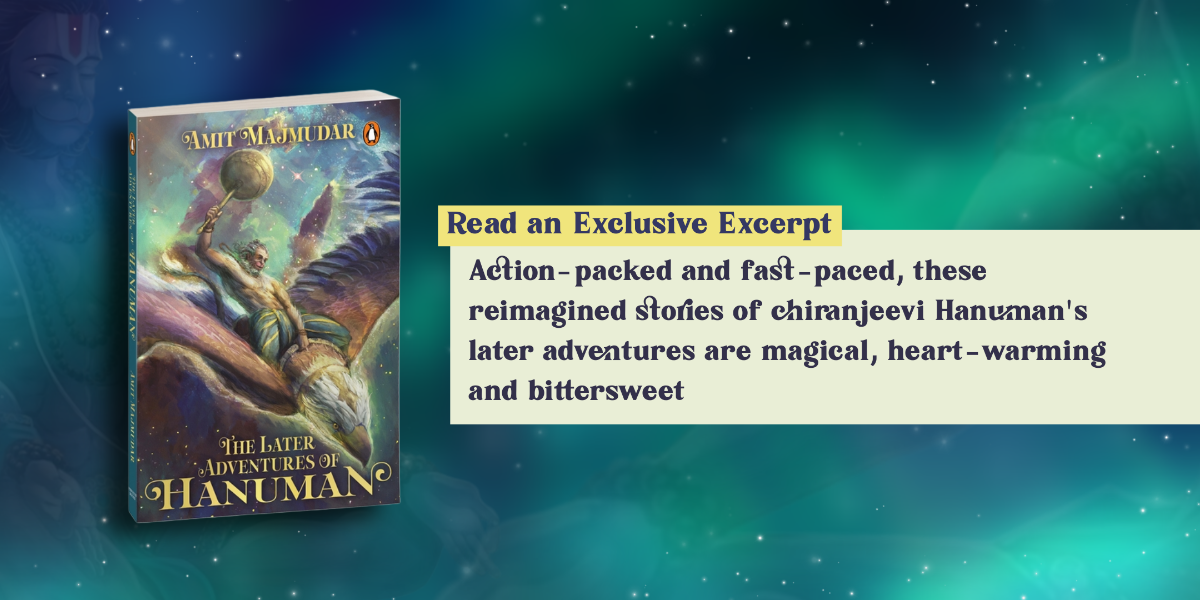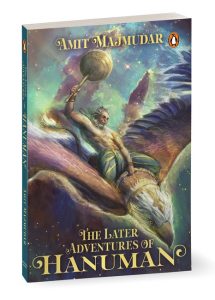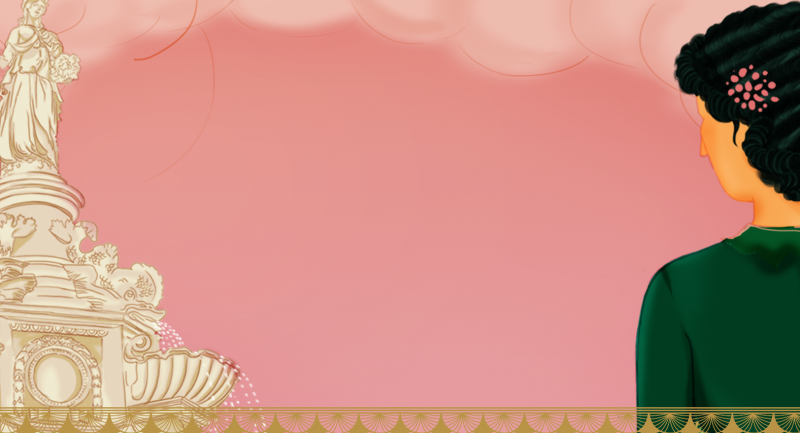
Join Hanuman, the legendary monkey-god, on an extraordinary quest in The Later Adventures of Hanuman by Amit Majumdar. Follow along as Hanuman embarks on thrilling adventures to uphold sacred traditions, confront oppressive rulers, and safeguard the timeless legacy of the Ramayana.

***
Hanuman grew more pious with age. Like many a worldly grandfather, he turned his mind to higher things. Mountaintop temples, pilgrim trails, sacred groves and rivers, libraries honeycombed with sacred scrolls, roadside Goddess shrines, holy cities—these drew him as never before. Maybe it was because he had stayed so close to the sacred by simply staying at Rama’s side. Or maybe he was just thinking more about mortality (even though he himself was immortal) and sickness (even though he was healthy) and old age (even though he could still touch his toes and none of his joints crackled).
One day, Hanuman visited a Shiva temple in Kashmir. A lingam made of light had ruptured the earth there, and a temple had been built around it. He was surprised to find the temple in disrepair, the grounds overgrown with weeds and the priests unusually skinny and haggard looking. Noon would see the bells ring and the lingam washed in milk, according to the ancient rite, but the chief priest, with a forlorn look, was adding water to the milk. This puzzled Hanuman. The temple was very crowded, and he saw visitors stuffing plenty of money into the donation box.
‘What’s all this?’ demanded Hanuman. ‘The temple is thriving, but it looks like it’s abandoned. I can’t even accuse you priests of embezzlement since you all look like you haven’t eaten a proper meal in years.’
The chief priest joined his hands before the talking monkey. The monkey hadn’t said he was Hanuman— Shiva incarnate, many said—but who else could it be?
‘It’s the king’s tax collector,’ the chief priest explained. ‘There’s more than enough money for the temple’s upkeep and for our own modest needs. We could even feed thousands of people a day if only we kept what we take in. But we don’t. Every day, the king sends a bureaucrat to our temple. He collects the temple tax, which is twenty-seven per cent right there, and then he adds the tax calculation surcharge, reimbursement for his commute, a coin-sorting fee, a coin-counting fee, and a per-hour rate for the whole process. By the end of all those assessments, sir, we barely have enough to buy a bottle of milk to mix with water for our noon rite.’
Hanuman frowned in righteous indignation. ‘By what right does the king take a cut of what belongs to Shiva? If it goes from Shiva’s devotees to Shiva, there’s
no need for a middleman. You say this bureaucrat dumps the donation box into his bag?’
‘He is very formal about it. He reaches in and helps himself.’
‘I promise you,’ Hanuman said, ‘today is the last time he’ll try collecting.’
That night, a fellow as portly as the priests were skinny had himself carried up the temple steps in a litter, like a little emperor. This was Rupianath, the bureaucrat in the service of the king.
The priests looked everywhere, wondering when Hanuman would sweep down with his gada and knock this collector to the ground. Rupianath would need to
be carried then, wouldn’t he? But the mysterious talking monkey was nowhere to be found. His promise had been words and nothing more, it seemed.
The priests lined up with their hands joined as usual— for they knew that Rupianath could take even more than he took if he sensed disrespect. They performed the other ritual of the temple, which involved praising the king’s piety, his generous police protection and his wise administrative skill.
Rupianath spat bright red betel-nut juice to one side (he demanded respect but showed none to the temple) and stuck his hand in the donation box. He grabbed his first handful of coins and raised his eyebrows in shock. With a yelp, he snatched his hand away. Torchlight revealed a bite mark.
‘There’s some kind of rat in there!’ shouted Rupianath, looking accusingly at the equally surprised priests.
‘Let’s take a look. Those are flat teeth that bit you,’ said the chief priest, getting a sense of what was going on. ‘So, this is a man’s bite?’
‘Or a monkey’s . . . or a God’s.’
Rupianath pointed at the box. ‘Stick your hand in there and take out a handful of coins.
The chief priest’s hand felt around in the bin for some time or seemed to do so. ‘I don’t feel any coins in here, sir.’
‘There were heaps of them! I felt them!’
‘Give it a try again,’ said the chief priest.
Rupianath stuck his hand in the box, and, this time, he yelped twice as loud. He held up a hand that was missing the tips of the index and middle fingers. The stumps were bleeding. With a furious set of kicks and blows from his cane, he smashed the box to splinters. When he did so, the world’s tiniest monkey—whose head the chief priest had been petting—became the world’s biggest monkey and sat cross-legged with his teeth bared and hissing.
The bureaucrat, unlike a conventional demon, required no violence from Hanuman to be vanquished. Rupianath’s terror and disbelief sent him shuffling
backwards to the steps, and he tumbled down cracking so many ribs that every breath for four months felt like being stabbed with seven knives. He ran howling from that vision of Hanuman resplendent and hostile, and he never dared visit that temple again.
***
Get your copy of The Later Adventures of Hanuman by Amit Majumdar wherever books are sold.









